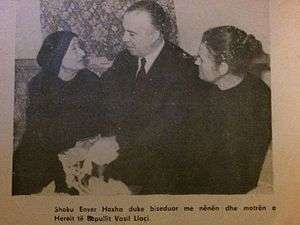Vasil Laçi
| Vasil Laçi | |
|---|---|
 Vasil Laçi on police photo before execution | |
| Born |
September 15, 1922[1] Piqeras, Albania |
| Died |
May 27, 1941 Tirana, Albania |
| Nationality | Albanian |
| Known for | An attempt to kill in 1941 Victor Emmanuel III, then King of Italy and Shefqet Bej Vërlaci, then Prime Minister of Albania |
Vasil Laçi also referred as Vasil Llaçi[2] (1922–41, People's Hero of Albania), was an Albanian patriot and monarchist[3] who attempted to kill Victor Emmanuel III, King of Italy and Shefqet Bej Vërlaci, Prime Minister of Albania after the occupation of Albania by fascist Italy.
Youth
Vasil Laçi was born in the village of Piqeras in southern Albania near the city of Sarandë on 15 September 1922, son of Mihal and Vitori. After the assassination attempt the Italian sources in Rome accused Greece of being behind him and called Laci a "Greek-Macedonian named Mihailoff Vasillaci" (di origine grecomacedone).[4][5][6] His father died at the age of 30, while Vasil was still a child. He spent his childhood in Piqeras, where he studied in the local elementary school. In 1933-1935 he worked in Durrës as a stevedore. In 1936 he moved to Tirana, capital of Albania, after being invited to work there.[7] The Italian invasion found him in Tirana. There he developed relations with patriotic groups, and helped several of their members escape from the Italian troops and police.[3] He worked initially as a dishwasher, and later as a servant. His cousin Kolë Llaçi was member of the Communist Group of Korçë (where he had migrated) and died in September 1941 in the prison of Voskopojë after being arrested by the Italians.[1] The Fascist military reports states that "Llaçi had communist ideas and he had been in contact with communist literature".

Assassination attempt against Victor Emmanuel III
Victor Emmanuel III decided to visit Albania on April 12, 1941 and he arrived one month later, after being reassured by the Italian fascist police of Tirana that all security measures had been taken. Laçi found out about Victor Emmanuel's visit to Albania fifteen days before his arrival, on May 2, 1941. Afterwards he managed to find a job at the Hotel International where Victor Emmanuel would stay, and borrowed a Beretta M1915 pistol from Pëllumb Koka, another Albanian patriot. On May 17, 1941 the 19-year-old Vasil Laçi, wearing Albanian national costume, attacked the car in which Victor Emmanuel and Shefqet Bej Vërlaci, Prime Minister of Albania were travelling accompanied by the ministers of the government. He fired four shots towards them while shouting "Long live Albania! Down with fascism", but failed to hit anyone.[3][7]

Aftermath and legacy
Laçi was arrested immediately and executed by hanging ten days later. The Italian fascist government attributed his attack to economic issues he had with Shefqet Bej Vërlaci, in order to prevent possible uprisings of the Albanian people.[3][7]
He was one of the first people to be awarded posthumously by the Albanian communist government with the award People's Hero of Albania. His assassination attempt was dramatized firstly as a book and later as a film in the 1980 movie entitled Bullets for the Imperator (Albanian: Plumba Perandorit). Currently, a monument stands in Tirana to honour his actions.[3]
References
- 1 2 Directory of Museums, Committee of Veterans of Tirana (May 1976), Vasil Llaçi, Hero i Popullit, Tirana, pp. 5,6
- ↑ Commando Superiore Carabinieri Reali dell Albania - document of 25 May 1941
- 1 2 3 4 5 Shqip on Vasil Laçi
- ↑ Bernd Jürgen Fischer (1999). Albania at War, 1939-1945. Purdue University Press. p. 102. ISBN 978-1-55753-141-4.
- ↑ Owen Pearson (11 July 2006). Albania in the Twentieth Century, A History: Volume II: Albania in Occupation and War, 1939-45. I.B.Tauris. pp. 153–. ISBN 978-1-84511-104-5.
- ↑ Antonio Spinosa (1993). Vittorio Emanuele III: l'astuzia di un re. Mondadori. p. 385. ISBN 978-88-04-36653-9.
L'attentatore era un ragazzo diciottenne, Vasil Laci Mihailoff, di origine grecomacedone
- 1 2 3 Owen Pearson, Albania in Occupation and War: From Fascism to Communism 1940-1945, 2006, p.153, ISBN 978-1-84511-104-5